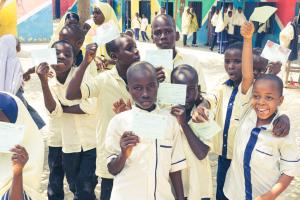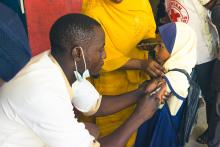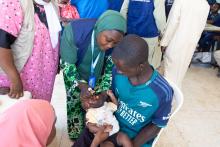Nigeria intensifies fight against vaccine-preventable diseases with nationwide measles–rubella and polio campaign
Abuja, The Government of Nigeria has launched a nationwide integrated vaccination campaign targeting more than 106 million people across all 36 states and the Federal Capital Territory.
The campaign delivers measles–rubella, polio vaccines, and HPV vaccination, to close immunity gaps and protect children and adolescents from life-threatening diseases.
Led by the National Primary Health Care Development Agency (NPHCDA) in collaboration with the World Health Organization (WHO), Gavi, the Vaccine Alliance, the Gates Foundation, UNICEF, and other partners, the campaign was officially flagged off in Abuja by the First Lady of the Federal Republic of Nigeria, Senator Oluremi Tinubu.
“This effort builds on our united front against polio, tuberculosis, HPV, and other vaccine-preventable diseases. With these vaccines, our children will be protected and enjoy a lifetime of safety,” the First Lady said.
Targeted population
The 2025 Integrated Measles–Rubella and Polio Campaign targets children aged 9 months to 14 years for measles–rubella vaccination and children under 5 years (0–59 months) for the novel oral polio vaccine (nOPV2). The campaign also delivers malaria chemoprevention (Seasonal Malaria Chemoprevention, SMC) for children aged 3–59 months, NTD treatments for persons aged 5 years and above, and HPV vaccines for girls aged 9 years.
Coordinating Minister of Health and Social Welfare, Professor Muhammad Ali Pate, described the campaign as a landmark moment for Nigeria’s health system.
“This campaign is proof of what strong leadership, community engagement, and partnership can achieve,” said Professor Pate. “We will continue working with our partners to ensure that every child in Nigeria is reached and protected.”
Minister of Education, Dr Tunji Alausa, represented by Mr Peters, noted that the campaign represents not only a health intervention but also an investment in education.
“By protecting our children from vaccine-preventable diseases, we are ensuring that they stay in school, thrive academically, and grow into productive citizens,” he said.
Chairman of the Senate Committee on Health, Senator Ipalibo Harry-Balingo, commended the initiative for integrating vaccine delivery with other health interventions.
“By combining vaccines with malaria and NTD interventions, this campaign reinforces routine immunization, strengthens the health system, and contributes to national health security,” she said.
United effort
The flag-off ceremony brought together key actors in Nigeria’s immunization efforts—Gavi, UNICEF, the Gates Foundation, parliamentarians, development partners, civil society organizations, State Primary Health Care Boards, donor agencies, and frontline health workers—who reaffirmed their commitment to reaching every child and building a resilient health system.
Traditional and religious leaders, including the Sultan of Sokoto, Alhaji Sa’ad Abubakar III, Ooni of Ife, Oba Adeyeye Enitan Ogunwusi, and President of the Christian Association of Nigeria (CAN), also pledged continued support to mobilize communities for vaccination.
Representing WHO, Dr Alex Chimbaru, Deputy Country Representative, described the campaign as a defining step toward health security for Nigeria and Africa at large.
“It reflects national leadership and collective commitment to ensure that every child, wherever they live, is protected against preventable diseases,” said Dr Chimbaru.
WHO technical support
To implement the campaign, WHO provided comprehensive support across all stages of pre-campaign preparation—developing training manuals, data collection tools, and detailed activity plans; and facilitating national and state-level training-of-trainers sessions down to the ward level, in close collaboration with NPHCDA and State Primary Health Care Boards.
WHO also deployed one technical assistant to each state to support implementation. In addition, experts from the WHO Country Office, Regional Office (Africa), and Headquarters have been actively present in various states to monitor campaign progress in real time. Their presence ensures rigorous oversight and enables timely, data-driven problem solving to address challenges as they arise helping to optimize performance and drive progress toward achieving campaign targets.
Implementation and integration
The campaign will be rolled out in two phases and four streams over a 10-day vaccination period, followed by a two-day mop-up.
Phase 1—covering northern states and Oyo—will integrate measles–rubella and polio vaccines in October. Additionally, Kano, Yobe, and Oyo states will incorporate NTD and malaria interventions alongside measles, rubella, and polio. Southern states will conduct stand-alone MR campaigns in early 2026.
Likewise, other routine immunisation antigens will be available for eligible residents in zero-dose local government Areas (LGAs). This large-scale effort supports Nigeria’s commitment to the Immunization Agenda 2030 (IA2030) and Universal Health Coverage (UHC).


